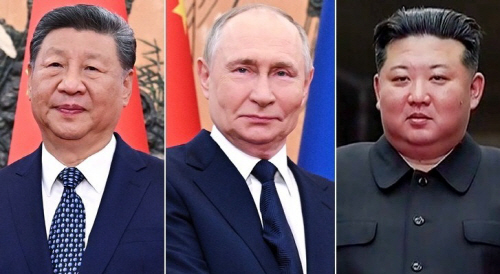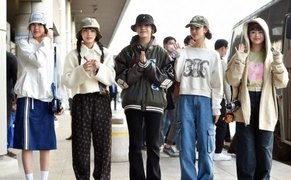 |
| From left, Chinese President Xi Jinping, Russian President Vladimir Putin, and North Korean leader Kim Jong-un. / Source: Yonhap News |
North Korean leader Kim Jong-un and Russian President Vladimir Putin’s simultaneous visit to China for the Victory Day celebrations is fueling expectations of a revived “North Korea-China-Russia” alignment. South Korea’s National Intelligence Service (NIS) assessed Tuesday that Pyongyang is unlikely to respond to Seoul’s dialogue overtures in the near future.
According to a report delivered to the National Assembly’s intelligence committee, the NIS said Kim departed Pyongyang by special train on September 1, crossed the border early on the 2nd, and was set to arrive in Beijing later that day. His wife Ri Sol-ju and sister Kim Yo-jong, vice department director of the Workers’ Party, accompanied him. There is also speculation that his daughter Kim Ju-ae may attend, which could further cement her standing as heir apparent if she meets Chinese President Xi Jinping.
The intelligence agency noted the possibility that Xi, Putin, and Kim will stand together atop Tiananmen Gate during the September 3 military parade, signaling a revival of the Cold War-era trilateral alliance. In the 1950s, beginning with the Korean War, the three countries built a strategic triangular partnership.
While bilateral summits between North Korea and China, and between North Korea and Russia, are expected during the visit, the NIS downplayed the likelihood of a trilateral summit. Such a gathering could escalate military-security tensions internationally, prompting the leaders to proceed cautiously.
The agency said North Korea views the Beijing ceremony as a chance to assert influence over the Korean Peninsula and to secure greater diplomatic room. Pyongyang is aiming to leverage improved ties with Beijing to secure economic aid and reinforce regime stability.
In contrast, its stance toward South Korea and the United States remains frigid. The NIS concluded that Pyongyang sees little need to adjust its policies toward Seoul and is unlikely to respond to dialogue proposals anytime soon. It also said North Korea is reluctant to engage Washington directly but may watch U.S. moves closely and look for openings for contact.
Separately, the NIS reported that in January last year it had confirmed the agency drafted an internal report opposing the designation of the 2023 stabbing attack on then-Democratic Party leader Lee Jae-myung as a “terrorist act.” At the time, then-first deputy director Oh Ho-ryeong instructed the agency’s legal affairs team to review the case. The review recommended classifying the incident as a special attempted crime rather than an act of terrorism.
Most Read
-
1
-
2
-
3
-
4
-
5
-
6
-
7





















